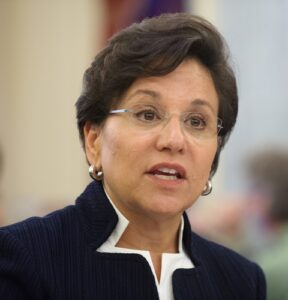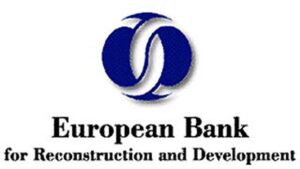
The challenges of the Ukrainian economy are related to the lack of insurance and it is already obvious that this hinders the attraction of investors, who first of all think about the protection of their capital.
This opinion was expressed by the US Special Representative for Ukraine’s Economic Recovery Penny Pritzker at the Ukraine Recovery Conference (URC2024) in Berlin on Wednesday.
“We all understand: in order for private investors to come in, insurance is needed. This is the first thing an investor thinks about,” she said.
According to Pritzker, she and her team took this as a call to action It was seconded by the US-based Development Finance Corporation (DFC) and global reinsurance broker Aon, which found practical innovative solutions to the issue. DFC already provides an insurance product designed for SMEs.
“We have purposely built an insurance model that is scalable. However, for this sector to flourish in Ukraine, many players are needed. I will encourage other insurance organizations, international institutions to think how they can join this model. I am confident: this mechanism will bring to Ukraine the necessary capital for its economic growth both when there is a war and when there is peace and reconstruction begins,” she emphasized.
According to DFC Executive Director Scott Nathan, before the war the corporation had a large portfolio in Ukraine, including risk insurance. Currently, to support the private sector and the country’s economy, one of the important toolkits in its portfolio is political risk insurance, which has closed $350 million worth of arrangements for three contracts in agriculture, manufacturing and education over the past year.
“Together with our partner ARCS, we as DFC can provide $50 million in war risk insurance, air raid risk, etc. to different clients. These can be small policies that can go to larger policies,” he noted.
At the same time, Nathan said that projects are being developed with Aon that can be scaled. One such project will be announced soon.
“Practically, we are helping local insurance companies build capacity for the country. Insurance is a mechanism to mobilize capital in the country and we hope to offer such an innovative tool. This is just the beginning, just part of our joint efforts to invest in Ukraine’s future, to lay the foundation for future investments when its recovery and reconstruction begins. It is important for the economy to work every day already now, during the war, and for this we need to build capacity in the insurance market. This is the key to success,” he said.
According to Aon President Erik Andersen, it is very important to provide protection by Ukrainian insurance companies, as well as to have a mechanism of pooled resources to provide insurance in the health care system, for small businesses, etc.,” he said.
“What we are saying is that we wanted to participate and invest our capital through the DFC, through local insurers. We have been working in Ukraine for a long time, it’s a big insurance program, and we want this capital to go to companies that operate in the country,” he said.

The volume of cargo transportation in containers in Ukraine in January-May 2024 reached the highest value for the last seven years and exceeded the pre-war indicators, follows from the analytical note of “Ukrzaliznytsya” (UZ), prepared for the meeting on the topic of intermodal transportation.
“In the first five months of 2024, the volume of cargo transportation in containers increased by 60% compared to the same period of 2023 and amounted to 116.129 thousand TEU (20-foot containers). The indicator is the highest for the last seven years and exceeds the volume of transportation for the same period in 2021 by 10%,” the document says.
It is indicated that in 2021, about 16% of the volume transported in containers accounted for transit, which is now virtually absent.
The main nomenclature in containers remains grain cargoes – 39%, as well as ferrous metals – 15%; cakes – 7%; oil – 6%; synthetic resins – 4%; sugar – 3%, chemicals – 2%.
During the period, about 25% of cargo in containers was transported in the import direction, 61% – in the export direction, 14% – in the domestic direction.
Since March 2023, UZ has been offering users of transportation services a new intermodal service that combines the transportation of container trains, contrailer trains and combined transport trains.
As of June 12, 2024, UZ transported 412 intermodal trains: 72 intermodal trains in the direction of Polish and Romanian ports and 340 such trains in the direction of Ukrainian ports.
It is also reported about changes in the terms of service provision. According to them, operators of intermodal train can postpone the date of its departure in one day, and operators staying outside Ukraine will be able to use UZ fitting platforms at domestic rates.

Strokes in Ukraine have grown younger by 10-15 years during the war, Health Minister Viktor Lyashko has stated.
“I can now go into the discussion and show the figures of the growth of strokes, to which leads exactly stressful situations in which we are. We can already today confirm the studies of the past years that the country where there is a war, strokes are getting 10-15 years younger,” he told the Ukraine Recovery Conference (URC2024) in Berlin on Tuesday.
Lyashko noted that “a completely different age group gets such diseases.”

Due to weather conditions as of Wednesday morning 237 settlements in Zhytomyr, Kyiv, Sumy, Khmelnytskyi, Cherkasy, Chernihiv regions and Kyiv remain without power supply, another 490 settlements are without power due to other reasons, including military operations, NEC Ukrenergo reported in Telegram.
According to the Ministry of Energy, the most settlements – 117 – without light in Kyiv region, another 46 – in Chernihiv region, 42 – in Khmelnytskyi, 14 – in Cherkasy, 13 – in Zhytomyr region and 5 – in Sumy region. In total, according to his information, without light 38 thousand subscribers.
According to Ukrenergo, the process of connecting consumers in Sumy region, where one of the energy facilities was damaged during a night drone attack, is ongoing. According to the Ministry of Energy, the Russian Federation attacked by drones a substation of the oblenergo in the border territory of Sumy region, as a result of which 1,016 subscribers in 14 settlements were de-energized.
At the same time, as Ukrenergo notes, it managed to promptly restore power supply to consumers in Kherson, who were de-energized due to the shutdown of several power facilities in the region during the air alert. Damage to buildings and equipment of one of them was discovered during the inspection.
In general, there is still a deficit in the energy system, as a result of which hourly shutdown schedules, as announced earlier, will be applied from 15:00 to 23:00.
At the same time, a record volume of imports from Romania, Slovakia, Poland, Hungary, Moldova is scheduled for today – 29,796 MWh with a maximum capacity in some hours up to 1,689 MW, which corresponds to the maximum possible value. The last record was recorded on Saturday – 29,100 MWh.

The European Bank for Reconstruction and Development (EBRD) will provide EUR140 million to support municipalities in Ukraine, EBRD Vice President for Policy and Partnerships Mark Bowman said.
“We need to support Ukraine, in particular the environmental infrastructure during the war and lay a strong foundation for its green recovery. This is a really important part of Ukraine’s European integration. I was very surprised by the super commitments that Ukraine has made on its way to the EU,” he said on the sidelines of the Ukraine Recovery Conference in Berlin on Tuesday.
Bowman recalled that the EBRD has been supporting Ukraine since the beginning of the full-scale war and has invested more than EUR4 billion in support of Ukraine. In addition, investments in energy efficiency projects, water supply, water drainage, public transportation in Ukraine continue to receive about EUR160 million.
“We are ready to provide additional funding of EUR140 mln to support municipalities that face serious problems and are in a difficult situation. They need to cope with the devastation. These difficulties are big,” the EBRD representative emphasized.
Bowman also recalled that the EBRD has developed the Green Cities program. This project started in 2016 and seven Ukrainian cities joined it. They continue to work even in conditions of war. In particular, two participants of this program have introduced war plans and continue to implement them.
In addition, the EBRD this week announced a EUR55 million investment in a joint venture with Goldback Solar Investment to build and operate new renewable energy facilities, predominantly solar, on 522 MHz.

The number of insurance companies in Ukraine in May 2024 decreased by one company and as of the end of the month there are 83 risk insurers in the market, 12 specialize in life insurance, one – with a special status (“Export Credit Agency”), according to the website of the National Bank of Ukraine (NBU).
In general, the number of participants in the country’s non-banking financial market in May decreased from 1,045 (as of April 30, 2024) to 1,014 (as of May 31, 2024).
The number of banks remained unchanged – 63.
According to the NBU, 26 financial companies, one risk insurer and two pawnshops were forcibly removed from the register. At the same time, one collection company and two credit unions were excluded on the applicant’s initiative. At the same time, one collection company was included in the register.
During May, eight financial companies, one insurer and one pawnshop had all their licenses revoked forcibly, while another 18 financial companies, one pawnshop and two credit unions had their licenses revoked voluntarily.
As of May 31, 2024, 555 financial companies (581 in April), 83 non-life insurers (84), 12 life insurers (the number has not changed), one insurer with special status, 119 pawnshops (121), 125 credit unions (127), five lessors, 40 insurance brokers and 74 collection companies (the number has not changed) were operating in the market of non-banking financial services.